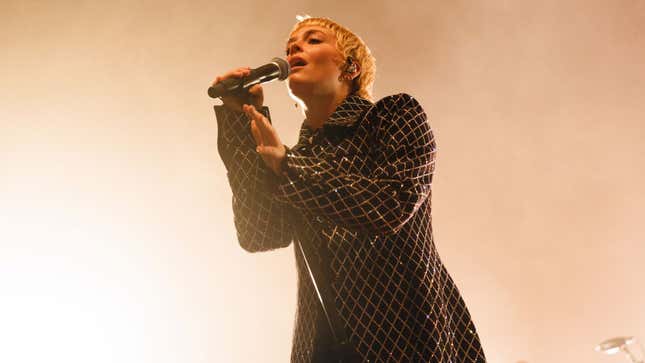I Felt Maggie Rogers’ ‘The Feral Joy Tour’ in My Teeth
The singer-songwriter went to Harvard to write an entire thesis on how public performances are spiritual experiences, and hers was that for me.
EntertainmentMusic

In the days leading up to Maggie Rogers’ stop at Radio City Music Hall for The Feral Joy Tour, I considered listening to her latest album, Surrender, constantly and on loop. As a teen, this was my way of “studying” for a concert: If I knew all the words better than the other sweaty bodies in the pit, that would somehow prove me to be a superior fan to everyone else in the crowd. But as I learned more about how Rogers made Surrender—and her careful intention behind it—I chose, instead, to enter Radio City as in the dark as I could.
Even though Surrender was composed entirely during covid isolation, Rogers said she wrote her sophomore album with the intention of playing it live—and over the course of the night, she wrung dry every second of her time on stage. “Whenever I’m in love, I feel it in my teeth,” she says in a pre-recorded monologue, before bursting onto the stage, belting out the long, dynamic, singular note she typically sings in the middle of “Overdrive.” Without a single word, the music leaps straight out of her body, erupting in a way that can be described as nothing other than feral—with a disposition as holy as it was wild, I couldn’t think of a more apt name for her tour.
This animalistic quality of joy is at the center of Surrender, an album inadvertently about our most intense emotions—elation, rage, desire, and longing—and our right to give in to all of them. “[Surrender] can have such negative connotations, but to me it is such a positive thing,” she told Teen Vogue when the record was first released. This intense catharsis was the same energy that undergirded songs like the high-pressured rock tune “Shatter” (sung with breathless desperation), and even the incredibly moving ballad “Horses.”
Arriving at a show is not unlike arriving at a house of worship—that feeling was especially exacerbated Wednesday night by the elegant carpets, mirrors, and chandeliers that deck every inch of the 91-year-old music hall. Church and concerts both contain the slow shuffle of a congregation (this one, mostly made up of leather-clad teens and 20-somethings) hoping to be transformed, in some way, by the time they leave. This is pretty much what drew Rogers to Harvard Divinity School in the first place. “I was constantly put in this sort of nontraditional ministerial position where I was being asked for moral and spiritual guidance even though that wasn’t the job I signed up to do,” Rogers said of her career in an article published ahead of her Harvard graduation, where she received a masters degree Religion and Public Life. Her thesis (also entitled “Surrender”) compared public performances—like concerts—with spiritual experiences.
-

-

-

-

-

-

-

-

-

-

-

-

-

-

-

-

-

-

-

-

-

-

-

-

-

-

-

-

-

-

-

-

-

-

-

-

-

-

-

-








































